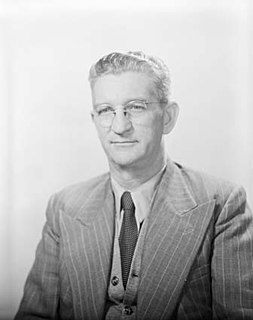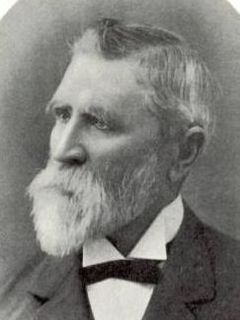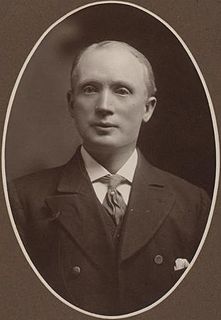The Division of Gwydir was an Australian electoral division in the state of New South Wales. The division was proclaimed in 1900, and was one of the original 65 divisions to be contested at the first federal election. As a result of the electoral redistribution of 13 September 2006, Gwydir was abolished and ceased to exist at the 2007 federal election.

The Tariff Reform League (TRL) was a protectionist British pressure group formed in 1903 to protest against what they considered to be unfair foreign imports and to advocate Imperial Preference to protect British industry from foreign competition. It was well funded and included politicians, intellectuals and businessmen, and was popular with the grassroots of the Conservative Party. It was internally opposed by the Unionist Free Food League but that had virtually disappeared as a viable force by 1910. By 1914 the Tariff Reform League had approximately 250,000 members. It is associated with the national campaign of Joseph Chamberlain, the most outspoken and charismatic supporter of Tariff Reform. The historian Bruce Murray has claimed that the TRL "possessed fewer prejudices against large-scale government expenditure than any other political group in Edwardian Britain".

The 1903 Australian federal election was held in Australia on 16 December 1903. All 75 seats in the House of Representatives, and 19 of the 36 seats in the Senate were up for election. The incumbent Protectionist Party minority government led by Prime Minister Alfred Deakin retained the most House of Representatives seats of the three parties and retained government with the parliamentary support of the Labour Party led by Chris Watson. The Free Trade Party led by George Reid remained in opposition.

The 1906 Australian federal election was held in Australia on 12 December 1906. All 75 seats in the House of Representatives, and 18 of the 36 seats in the Senate were up for election. The incumbent Protectionist Party minority government led by Prime Minister Alfred Deakin retained government, despite winning the fewest House of Representatives votes and seats of the three parties. Parliamentary support was provided by the Labour Party led by Chris Watson, while the Anti-Socialist Party, led by George Reid, remained in opposition.

Francis Clarke was an Australian politician.

Victor Dennis Kearney was an Australian politician. Born in Armidale, New South Wales, he was educated there at De la Salle College. He became an organiser of the Australian Workers' Union and then secretary of the Canberra Trades and Labour Council. In 1956, he was elected unopposed to the Australian House of Representatives seat of Cunningham, representing the Labor Party, in the by-election caused by the death of Billy Davies. Kearney's election was the last time a member with full voting rights was returned unopposed to the House. Kearney held the seat until he retired in 1963, although he unsuccessfully tried to regain Cunningham as an independent in 1966. Later, having moved to Queensland, he became a member of the Democratic Labor Party, contesting the seat of McPherson for the DLP in 1972. He died in 1982.

Edmund Lonsdale was an Australian politician. Born in Morpeth, New South Wales, he was schooled in Maitland before becoming a bricklayer, builder and contractor. He was also an alderman on Armidale Shire Council.

Alexander Hay was a New Zealand-born Australian pastoralist, businessman and politician. He was a member of the Australian House of Representatives from 1919 to 1922, representing the electorate of New England for the Nationalist Party (1919–1920), Country Party (1920–1921) and as an independent (1921–1922).

Charles Edward Griffiths was an Australian politician. Born in Jesmond, New South Wales, he attended public schools and became a railwayman with New South Wales Railways, rising to become an official in the Australian Railways Union. He was appointed to the Australian Labor Party's New South Wales Executive before his election to the Australian House of Representatives in 1949 as the member for the new seat of Shortland. He held the seat until his retirement in 1972. Griffiths' 23 years as a member of federal parliament coincided with Labor's longest stint out of office.

Francis Edward McLean was an Australian politician. Born in Sydney, he received a primary education before becoming a clerk, and eventually an accountant and businessman. In 1894 he was elected to the New South Wales Legislative Assembly as the member for Marrickville, a member of the Free Trade Party. He held the seat until 1901, when he transferred to federal Parliament, winning the House of Representatives seat of Lang, again for the Free Trade Party. In 1903, he unsuccessfully attempted to defeat prominent Protectionist and former Premier of New South Wales William Lyne in his seat of Hume. He retired from politics and died in 1926.

Albert Clayton Palmer was an Australian politician. He was a member of the Australian House of Representatives from 1906 to 1907 and from 1907 until his death, representing the electorate of Echuca for the Anti-Socialist Party and its successors the Commonwealth Liberal Party and Nationalist Party.

William Harrison Story was an Australian politician.
This article provides information on candidates who stood for the 1901 Australian federal election. The election was held on 29/30 March 1901.
This article provides information on candidates who stood for the 1903 Australian federal election. The election was held on 16 December 1903.
This article provides information on candidates who stood for the 1906 Australian federal election. The election was held on 12 December 1906.

Thomas Glassey was an Irish-born Australian politician.
Sir Kenneth James Morris, was an Australian politician who served as Deputy Premier of Queensland from 1957 to 1962. Born in Brisbane, he was educated at Brisbane Grammar School before becoming the director of his family's boot manufacturing firm. In 1931, he married Ettie Louise Dunlop.

Sir Walter Kingsmill was an Australian politician who served as a Senator for Western Australia from 1923 to 1935. He was President of the Senate from 1929 to 1932.

Robert Storrie Guthrie was a Scottish-born Australian politician. He was educated at Glasgow before becoming a seaman and migrating to Australia in 1887. He was South Australian Secretary and Federal President of the Seamen's Union before entering the South Australian Legislative Council as a Labor member in 1891. In 1903, he left the Council to contest the Australian Senate, in which he was successful. Originally an Australian Labor Party Senator, he left the party in the wake of the 1916 split over conscription, joining the Nationalist Party.
Douglas Clive Hannaford was an Australian politician. Born in Riverton, South Australia, a son of Walter Hannaford MLC, and one of many notable descendants of Susannah Hannaford, he was educated at Riverton and District High School with a final year at Prince Alfred College in Adelaide before returning to Riverton as a farmer. He served on District Council of Gilbert and was a co-ordinator of civil defence during World War II, having been rejected for military service due to poor health.













